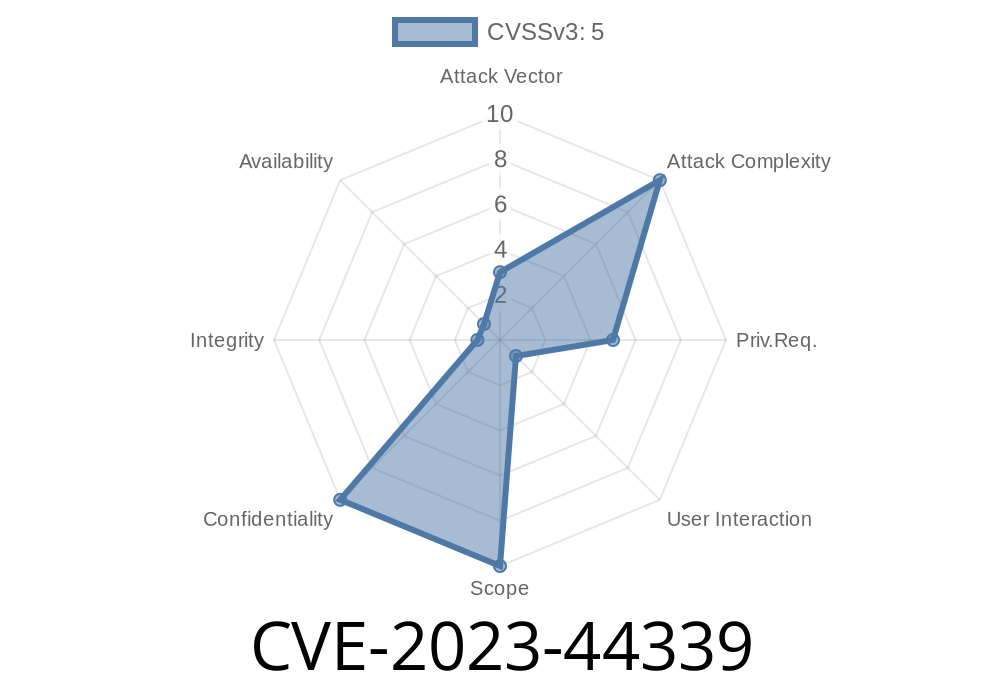CVE-2023-44339 is a recently disclosed security vulnerability affecting Adobe Acrobat Reader versions 23.006.20360 (and earlier) and 20.005.30524 (and earlier). This vulnerability is caused by an out-of-bounds read, which could allow attackers to leak sensitive memory when a victim opens a specially crafted PDF file.
In this deep dive, we'll break down what CVE-2023-44339 means for you, how it works, the potential risks, and what you can do to stay safe. We'll include code snippets, link to original Adobe advisories, and discuss how this vulnerability could be exploited in the real world—all in simple, easy-to-understand terms.
What is CVE-2023-44339?
CVE-2023-44339 is an out-of-bounds read flaw. In plain language, this means that Adobe Acrobat Reader could be tricked into reading data outside the intended memory segment while processing certain PDF files. This can leak pieces of memory that an attacker should not have access to—even data that belongs to other open programs or sensitive system processes.
Official References
- Adobe Security Bulletin APSB23-51
- NIST National Vulnerability Database: CVE-2023-44339
How Does It Work?
The vulnerability lies in the way Acrobat Reader processes certain objects or streams within a PDF. When it reads more data than it should from memory, attackers can use this "out-of-bounds" data to bypass certain security features such as Address Space Layout Randomization (ASLR). ASLR is meant to stop attackers from knowing where stuff is in your computer's RAM, making it hard for exploits to work. If an attacker can leak memory, they can defeat this protection.
Exploit Demonstration (Code Example)
Below is a simplified example (pseudocode) showing how an out-of-bounds read might be triggered in a parser. *(Note: The actual vulnerability in Acrobat involves complex PDF structures and proprietary code. This is a conceptual demo for educational purposes.)*
// Vulnerable function: simplified
void processPDFObject(unsigned char *buffer, size_t length) {
uint32_t index = parseObjectIndex(buffer);
// Fails to check index properly
uint32_t value = ((uint32_t *)buffer)[index]; // <- Can read out-of-bounds
processValue(value);
}
If an attacker crafts a PDF so that index is much larger than it should be, Acrobat might read memory well beyond the current PDF object—revealing sensitive information.
A malicious PDF could contain something like
%PDF-1.7
1 obj
<<
/Type /Catalog
/OpenAction 999999 % triggers out-of-bounds read by large index
>>
endobj
xref
...
trailer
<< /Root 1 R >>
%%EOF
Here, /OpenAction 999999 could be used to trick the PDF engine into referencing a huge invalid index.
Read memory regions that may contain passwords, cryptographic keys, or other sensitive information.
- Gather pointers and addresses in memory, defeating ASLR and paving the way for more serious attacks (like remote code execution).
This bug has a CVSS score of 7.5, making it a high severity issue—especially because opening PDFs is so common.
What should you do?
1. Update Acrobat Reader: Adobe patched this vulnerability in October 2023 (see the security update). Download the latest version from get.adobe.com/reader.
Be careful with PDFs: Do not open PDF files from unknown or untrusted sources.
3. Enable security features: In Acrobat Reader, enable Protected View (Edit > Preferences > Security (Enhanced)).
Additional Reading & References
- Intezer blog: PDF Exploits Explained
- CVE Details: CVE-2023-44339
- Common Mitigations for Memory Disclosure
Final Thoughts
CVE-2023-44339 is a good reminder that even everyday software like PDF readers are targets for hackers. Thanks to a quick patch from Adobe, users can protect themselves by upgrading. But the best defense is always caution—never open files from sources you can't trust, and keep your software updated.
If you're interested in the technical details or want to see more about this vulnerability as it develops, keep an eye on the official Adobe security page and the National Vulnerability Database.
*Stay safe, stay smart, and keep your software up to date!*
Timeline
Published on: 11/16/2023 10:15:10 UTC
Last modified on: 11/22/2023 17:15:45 UTC
